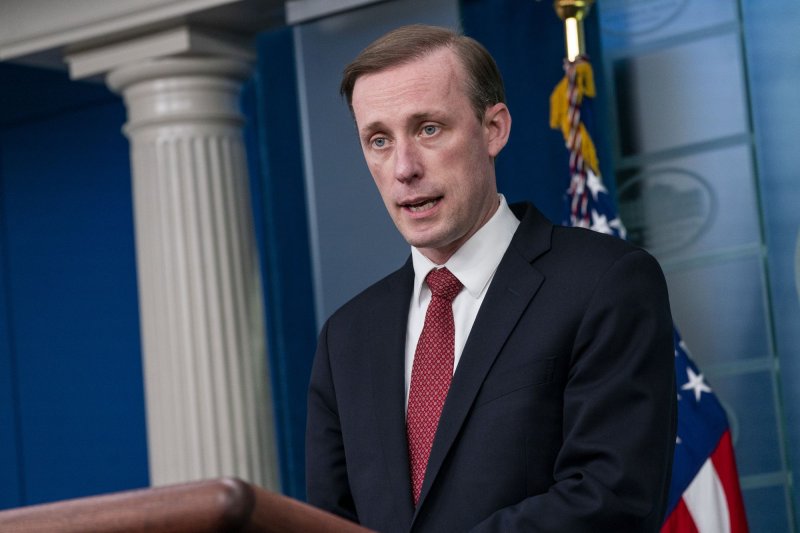1 of 2 | National security advisor Jake Sullivan met with his Chinese counterpart in Rome on Monday where they discussed a number of issues, including Beijing's relationship with Moscow amid the latter's invasion of Ukraine. File Photo by Shawn Thew/UPI |
License Photo
March 14 (UPI) -- U.S. national security advisor Jake Sullivan raised concerns with his Chinese counterpart on Monday over Beijing's relationship with Moscow amid the Kremlin's war in Ukraine.
The seven-hour meeting between Sullivan and China's top diplomat and Politburo member Yang Jiechi was months in the making but was held in Rome a day after unnamed U.S. officials told news organizations including The New York Times and The Washington Post that Russia has asked China for military and economic assistance.
Russia invaded Ukraine Feb. 24, but the attack has been bogged down by strong Kyiv military resistance and has been met with wide-ranging international sanctions, which have already taken a bite out of its economy, causing the value of the ruble as well as the public's buying power to tumble and raising concerns that Moscow may default on its international obligations.
A senior administration official speaking to reporters on the conditions of anonymity in a call following the meeting did not corroborate the claim that Russia has inquired about assistance from China, but said they do have concerns, which Sullivan expressed to Beijing Monday in Rome.
"We do have deep concerns about China's alignment with Russia at this time, and the national security adviser was direct about those concerns and the potential implications and consequences of certain actions," the senior administration official said.
Ned Price, the State Department spokesman, reiterated this message to reporters during a regular scheduled press conference.
"The national security advisor and our delegation raised directly and very clearly our concerns about the PRC's support to Russia in the wake of the invasions, and the implications that any such support would have for the PRC's relationship not only with us, but for its relations around the world," Price said, referring the Asian nation by the initials of its official name, the People's Republic of China.
Price also would not comment on the situation directly but said they are watching "very closely" the extent to which any country, including China, provides support in any form to Russia.
"Any such support from anywhere in the world would be of great concern to us," he said. "It would be, of course, the greatest concern if any country like the PRC were to be doing that -- a country that, by the way, has tremendous leverage with Russia," he said.
He added that they have told Beijing that the United States will not allow any country to aid Russia or compensate it for the losses it has injured over its war in Ukraine.
Price also confirmed that the administration has shared its concern over China's potential willingness to aid Russia with allies and partners.
Fears over China potentially aiding Russia come as Beijing has come under criticism from democratic nations over the light hand it has taken to its ally over invading Ukraine.
Beijing has not imposed sanctions over Moscow's attack on its neighbor, and hours after the invasion began, it lifted all its wheat-import sanctions on Russia while other nations imposed punitive measures. China also twice abstained to vote on U.N. resolutions to condemn Russia's attack.
China has also been attempting to amplify Russia's disinformation campaign, specifically concerning allegations of chemical and biological weapons laboratories in Ukraine, which the United States has repeatedly denied as debunked.
Beijing has also made calls for peace, with Price describing China's neutral stance to the conflict and orders for a diplomatic solution to the war as "somewhat of an ambivalent message."
China on Monday rejected the accusation that Russia asked it for help.
"The U.S. has been maliciously spreading disinformation targeting China," Foreign Ministry spokesman Zhao Lijian said during a regular press conference.
He said China's position on the "Ukraine issue" is to pay a constructive part in promoting peace.
"The top priority at the moment is for all parties to exercise restraint, cool the situation down instead of adding fuel to the fire and work for diplomatic settlement rather than further escalate the situation," he said.















